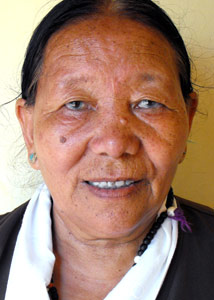Name: Tenzin Tsomo
(Alias: No)
Gender: Female
Interview Age: 68
Date of Birth: 1942
Birthplace: Nyero Thoepa, Utsang, Tibet
Year Left Tibet: 1960
Profession: N/A
Monk/Nun: No
Political Prisoner: No

Interview No.: 60M
Date: 2010-04-12
Language: Tibetan
Location: Doeguling Settlement, Mundgod, Karnataka, India
Categories: Oppression and Imprisonment
Keywords: childhood memories, Chinese -- first appearance of, Chinese -- oppression under, Chinese rule -- life under, customs/traditions, escape experiences, forced labor, imprisonment, marriage practices, taxes, thamzing/struggle sessions, Utsang, wealthy/upper class
Summary:
Tenzin Tsomo fondly remembers the village and the happy life she led. Her family was among the richest in the village, owning a large tract of land and animals. Her father was a representative of the government who was responsible for collecting taxes. The practice of polygamy was prevalent in those days, her mother being married to three husbands who were brothers.
Tenzin Tsomo recounts the amicable situation at home mainly due to the fairness of her mother. She explains how the husbands take on different responsibilities in the family and how the wife and children treat each one equally.
When the Chinese first appeared in her village they would occupy her home for a night and move on to another village the next day. Later Chinese took up residence in the village and arrested her mother's three husbands, who were subjected multiple times to public humiliations and beatings. Tenzin Tsomo's family was not allowed to speak with other villagers and her family property and crops were distributed among the poor people.
Interview Team:
- Rebecca Novick (Interviewer)
- Tenzin Yangchen (Interpreter)
- Pema Tashi (Videographer)

